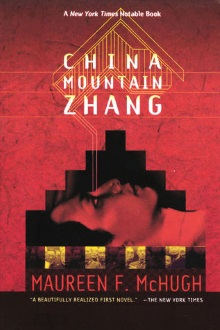
Since this is an older novel, it was obviously another pick out of Jo Walton’s What Makes This Book So Great. This was Maureen F. McHugh’s debut novel and it was nominated for both the Hugo and the Nebula though it didn’t win either. As its title suggests, China and Chinese culture takes center stage in this novel. It’s far from being the first Western science-fiction work to do so, notably David Wingrove’s Chung Kuo series was started in 1989. Still this book is more highly regarded and is very enjoyable while I found the Chung Kuo series to be an impressively wordy mess back when I tried it ages ago.
The main character is Zhang Zhong Shan, or alternately Rafael Zhang, a young man born in America in the 22nd century. Though he looks outwardly Chinese in all respects, he is actually of mixed Chinese and Hispanic descent due to genetic engineering to alter his appearance. During this time, China is the dominant superpower and the United States has undergone a Communist revolution known as the Cleansing Winds campaign. At the beginning of the story, Zhang works as an engineering tech in the construction industry. His supervisor offers to match-make his daughter, San Xiang, to Zhang in exchange for a coveted opportunity to study in China. The hidden cost is that San Xiang is extremely ugly due to a bone defect on her face but Zhang has another secret in addition to his hidden Hispanic heritage: he is homosexual.
Though the narrative always returns to Zhang, this is a mosaic novel that covers the lives of a number of other characters, some of whom have only a very tangential relationship with him. One thread takes readers to Mars where the settlers who have nowhere else to go eke out a hard life. Another explores the community of kite fliers in New York, a sport somewhat similar to parasailing that Zhang enjoys watching. The fliers are connected to their respective kites and so feel it as part of their body while the audience can jack-in to experience the sensation of flying for themselves. Zhang’s own story takes him far from home as the years pass, transforming him into a mature adult in the prime of his life and at the height of his powers, his relationships with other people changing along the way.
There’s no action in this novel and none of the characters are movers and shakers. In fact, there’s no overarching plot beyond Zhang’s process of maturing into a productive member of society. Instead these are slice of life stories of mundane characters in a near future society dominated by China. The same goes for the technology we see here. There’s is plenty of advanced devices on display, for example everyone seems to have implants that allow them to connect to computer networks and Zhang learns to design engineering projects that effectively has the computer reading his mind, but all this is in service of daily life. That, I think, is what made this novel so special when it came out, that it’s about ordinary people living ordinary lives in a relatively realistic vision of the future.
These days we take it for granted that China will be one of the world’s dominant superpowers for the foreseeable future even if the extent of the domination is still up for debate. But back in 1992 when this novel was first released this was far from being a certain thing, making it remarkably prescient. It’s also impressive for how well the author understands Chinese culture and incorporates it into the story. One of the most interesting things to me about Zhang is that he’s always conscious that he’s only half-Chinese and hence feels somewhat like an impostor. This defensiveness leads him to be overly correct in affecting the proper Chinese mannerisms, such as when he carefully chooses and presents gifts when invited to dinner or when he addresses people in conversation. When he arrives in China, this extreme conscientiousness causes him to be regarded as archaic and quaint.
Barring a monologue by Zhang towards the end of the novel that feels a bit out of place there’s no exposition on how this society is run or how it’s organized on a global level. I’m not even sure if his description of how the society progressed from capitalism to the current system is meant to be taken seriously or not. I take this to mean that this is very much a personal level view of the society and the novel isn’t ambitious enough to attempt to build a completely coherent world on a larger scale. I also dislike the lack of a proper sense of closure for some of the characters. In a way the novel feels too short. I’d love to know how things turn out later in their lives even if they have no further interaction with Zhang.
One observation that I have is that this book achieved notability by being essentially a work of literary fiction in a science-fiction setting. Instead of being plot driven it is character driven and there are no big science-fiction ideas at all. Indeed I believe that you could remove the science-fiction trappings and it would still be more or less the same novel. At the same time, if you judge this by the higher standards of literary fiction, I think this would count as competent but not exceptional. As such I’m of two minds about it. There’s no doubt that I enjoyed it very much and I love how it makes excellent use of Chinese culture. But it also made me realize how lacking genre fiction feels if you directly compare them to literary fiction.